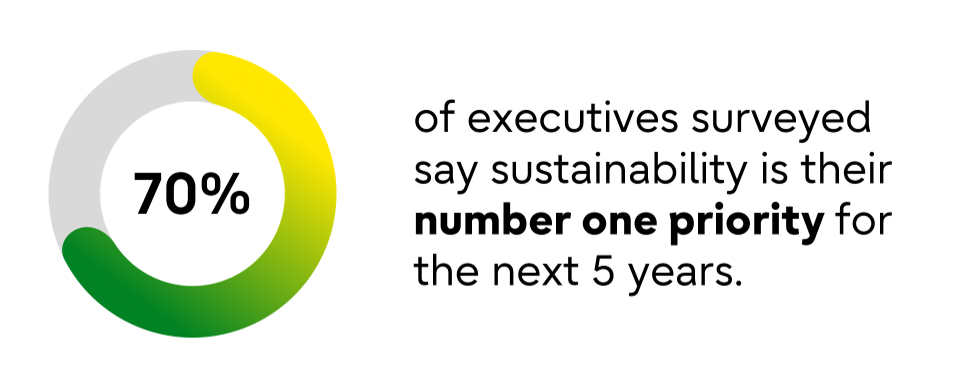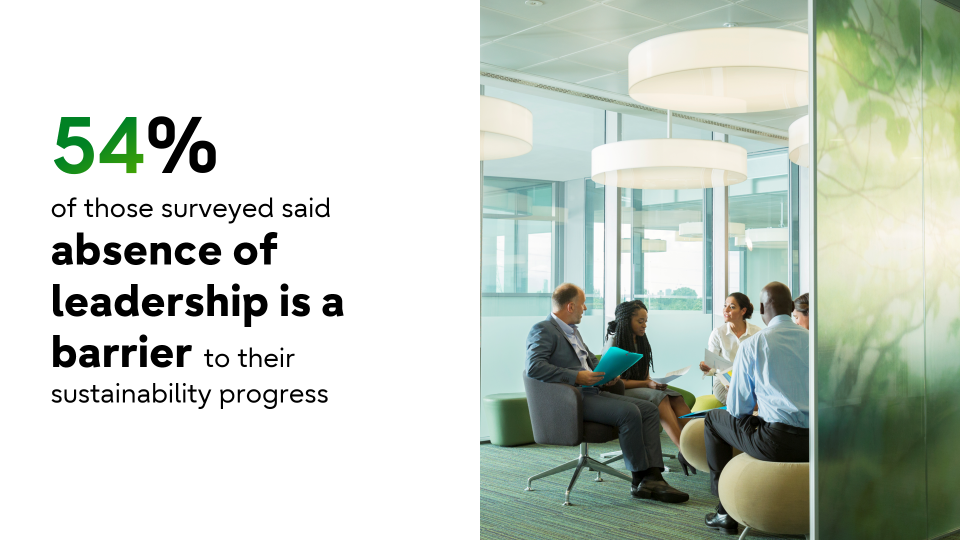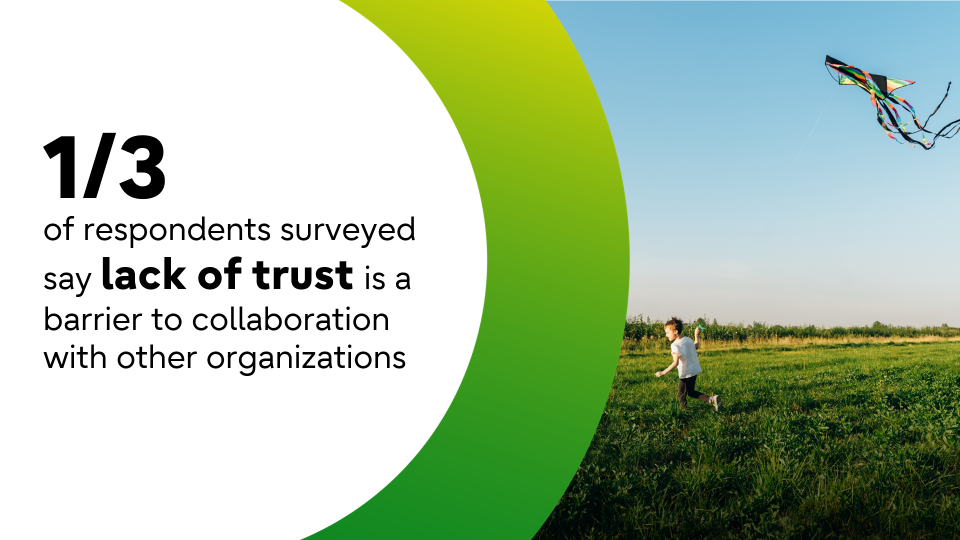Sustainability Transformation requires a united front

Report|2024-01-12
4 minute read
In the build-up to the World Economic Forum Annual Meeting 2024 (WEF), new research from Fujitsu confirms that executives now view Sustainability Transformation as essential for business growth. Trends from the study show that contributing to the greater good and boosting profit need not be opposing forces, but, rather, can work in harmony.
However, the results also show that to make meaningful progress and get on course to meet sustainability goals, companies will need to join forces with trusted partners.
Key findings:
- Highly collaborative organizations are more likely to achieve outcomes from their sustainability strategies
- Sustainability is the number one priority for 70% of those surveyed.
- 51% of executives say poor stakeholder cooperation is a dominant threat to sustainability journeys
- One-third of executives surveyed say lack of trust derails their partnerships with other organizations
- 54% of those surveyed say absence of leadership is the main barrier to sustainability progress
In November and December 2023, Fujitsu conducted a survey of 600 C-suite executives in 15 countries on their attitudes toward sustainability management. The key findings speak to the mission of this year’s WEF meeting taking place in Davos: to rebuild trust and cooperation among the global society, so that, together, world leaders can manage geopolitical tensions, climate crises and economic turbulence more effectively.
To achieve real progress, businesses will need to form sustainability partnerships that reach across markets and industries. The successful organizations will be those that form bonds of trust and mutual dependence to resolve global environmental issues, develop a healthy digital society, and improve well-being at a global level.
As business leaders prepare for this year’s forum, Fujitsu presents an early look at findings from its newest research. As a strategic partner of the 2024 World Economic Forum, we will explore these results in more depth onsite at WEF, ahead of the full release of the research study this spring.
Collaboration boosts sustainability productivity
According to the research, organizations that are more collaborative with other companies are more likely to achieve returns on their sustainability strategies. The majority of organizations (57%) who are advanced in sustainability collaboration are also achieving outcomes from their sustainability initiatives. In contrast, only 23% of the companies of lower collaborative maturity have managed to secure real results from their sustainability projects.
In terms of the sustainability outcomes companies are aiming for, executives confirm that their organizations are passionate about delivering a positive impact through Sustainability Transformation, and see it as a core piece of their growth plans. Sustainability is the number one priority for 70% of those surveyed.

The top drivers of sustainability initiatives are:
- Attracting investment
- Supporting business expansion
- Increasing transparency of corporate information
- And making a positive impact on society
These results show that executives now view Sustainability Transformation as integral to business growth. Moreover, contributing to the greater good and boosting profit need not be opposing forces, but, rather, can work in harmony and even symbiosis.
Deficiencies in stakeholder cooperation, leadership and trust can sabotage progress
The prospect of making meaningful sustainability progress is threatened by a range of factors all related to collaborative breakdown. One of which is poor stakeholder coordination. The majority of executives surveyed (51%) state that poor cooperation among stakeholders is a dominant challenge obstructing progress towards their sustainability objectives. External pressures, for example from economic factors, may tempt some stakeholders to prioritize short-term gains over long-term sustainability goals. A lack of alignment across sustainability initiatives is likely to lead to dysfunction, which, in turn, breeds frustration and distrust between partners.
To build trust and cohesion into partnerships, it is essential to establish a mutual understanding of each partner’s perspective and priorities, so that decision makers can develop a clear working relationship that considers these and aids cooperation. The need for clear direction and strong leadership at this foundational point in the partnerships also speaks to the influential role played by decision makers in general with sustainability progress. And in fact, the majority of executives surveyed (54%) say the absence of leadership is the top issue impeding progress on sustainability initiatives.

Without internal alignment and clear leadership, organizations will be unable to form the solid external partnerships they require to achieve their sustainability goals. The businesses that thrive will be those that embrace values of transparency, consistency and accountability among leaders.
Unfortunately, in many cases, distrust is eroding the health of sustainability alliances between organizations. Overall, around one-third of respondents surveyed cite lack of trust as a barrier in their collaboration with other organizations. This sentiment rises to 60% of companies at the lowest level of Sustainability Transformation maturity. In contrast, only 10% of those at the highest level of Sustainability Transformation maturity share this opinion.

Without trust, sustainability partnerships will be riddled with missed opportunities. Partnerships with an insufficient level of trust will be hindered by a reluctance to share resources such as expertise, data and technologies, preventing them from attaining their full collaborative potential.
The collaborative opportunity is one that organizations cannot afford to pass up. Fujitsu research shows that companies need as much help as they can get in complying with the complex regulations and meeting the required standards on the path to sustainability targets. The relative majority of executives surveyed (45%) say their organization’s performance is behind expectations against external sustainability targets.
Uniting behind Sustainability Transformation
To get on track with reaching sustainability goals, the most effective route to success is to adopt a united front, rather than going it alone. By leaning on a network of partners that share resources such as data and expertise, organizations can accelerate their own progress in addressing global sustainability challenges.
But business leaders must remember that trust will determine the fate of Sustainability Transformation ecosystems. Partnerships between organizations should be built on shared values, alignment and clear leadership. This stable foundation will help hold collaborative projects together.
Organizations that manage to successfully leverage their sustainability partnerships will see first-hand that boosting profit and contributing to the greater good need not be opposing forces.
Connect with us in Davos | The World Economic Forum 2024
For deeper insights and an opportunity to explore how to apply these principles to your organization, stay tuned for the full research study, due to be released later in spring 2024.


Featured insights
Balancing business goals with the environment: A planet full of opportunities

Business strategies for a connected world : Prospering in the digital society

Convenience and well-being at all ages: A digital leap to a fulfilling life

